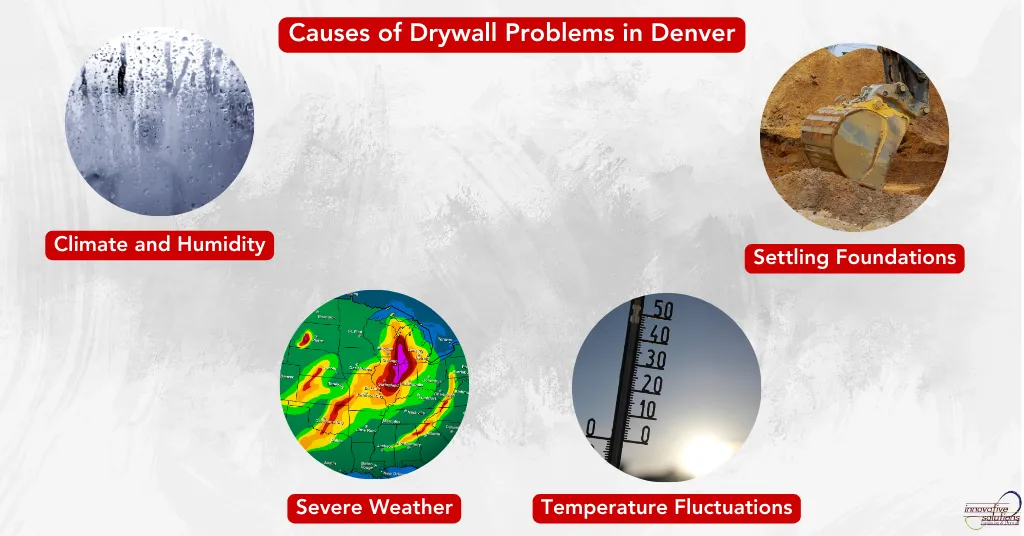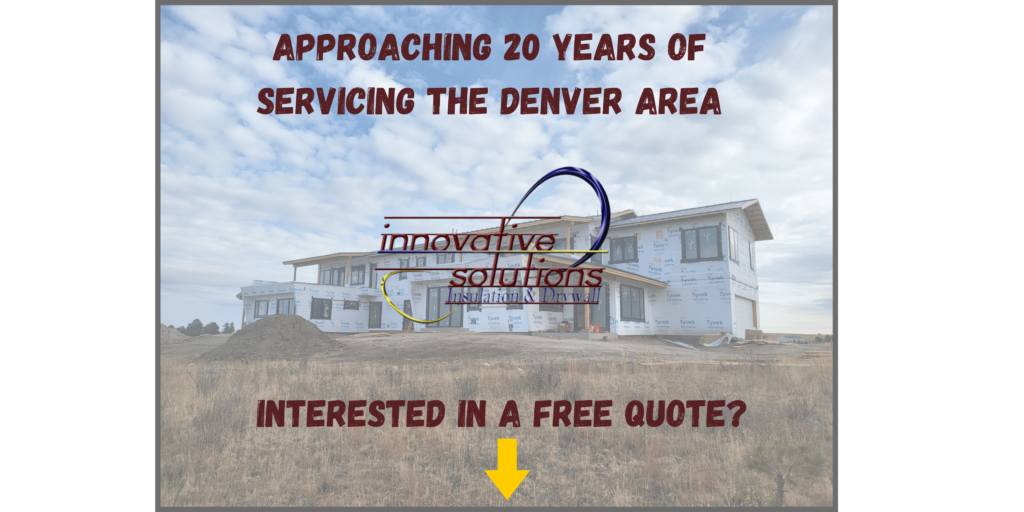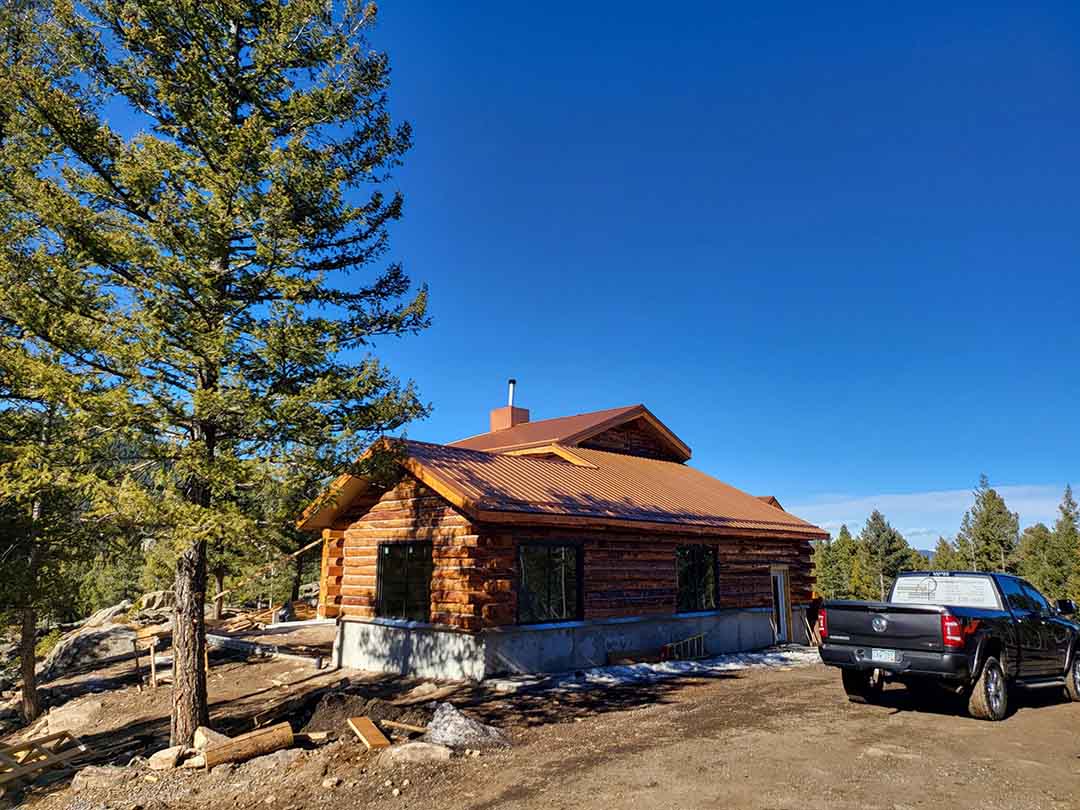Problems & Fix: Common Drywall Problems in Denver
Due to its unique climate and environmental conditions, there are numerous common drywall problems in Denver. The most common drywall problem here is cracks, which occur due to the natural settling of homes and frequent temperature fluctuations.
Another frequent issue caused by the contraction of materials in the dry air is nail pops. Joint separation often arises in Denver’s low-humidity environment as drywall tape and joint compound shrink over time.
Moreover, moisture damage from heavy snowfalls, ice dams, or plumbing leaks can compromise drywall. This often leads to mold and mildew if moisture is not treated properly.
Identifying these challenges is important to effectively manage and prevent common drywall problems in Denver. For proper drywall maintenance and repair, it’s helpful to refer to resources like the Gypsum Association, which provides expert guidelines on drywall installation and care.
Common Types of Drywall Problems in Colorado
Denver’s unique environmental and structural factors play an important role in causing drywall issues.
I’ll discuss the five most common drywall problem causes and their impact along with a brief explanation of what has probably gone wrong.
[wpdatatable id=52]
Causes of Drywall Problems in Denver
Drywall issues in Denver are mostly due to the region’s unique weather. Identifying these causes can help homeowners and builders spot problems early and take steps to prevent serious damage.

To help you out, we as Innovative Solutions Insulation and Drywall are here to provide you with drywall fixing services that are both comfortable and aesthetic. With multiple awards for our services and numerous satisfied clients, we offer nothing less than the best to you.
If you are looking for professional drywall installation services in Denver that don’t just patch things up, contact us now.
Climate and Humidity
Denver’s dry climate has low humidity, which is comfortable for people but tough on building materials. Drywall and joint compounds lose moisture over time, causing them to shrink.
This shrinking can lead to cracks in walls and ceilings or gaps where drywall panels meet.
Temperature Fluctuations
It is important to know that Denver often experiences temperature fluctuations, sometimes all in a matter of days. These shifts cause building materials to expand and contract repeatedly.
For drywall, this constant movement can weaken the taped joints, loosen screws or nails, and cause cracks, especially in corners and ceilings. Homes without good insulation or temperature control are more likely to have these problems.
Settling Foundations
Denver’s soil, which often contains a lot of clay, reacts strongly to changes in moisture. When it’s wet, the soil swells; when it’s dry, it shrinks. This movement makes the foundation shift, putting stress on the whole house.
Since drywall is rigid, it usually shows the first signs of this movement with diagonal cracks around windows, doors, and corners.
Severe Weather
Denver’s weather can be extreme, with heavy snow, hail, and sometimes heavy rain. These conditions can cause water to get inside through roof leaks, ice buildup, or poorly sealed windows and doors.
If moisture sticks around, it can lead to mold and mildew, which can damage the drywall further and create health risks for people living in the home.
High Altitude
Denver is over 5,000 feet above sea level, and the lower air pressure can affect building materials in subtle but important ways.
With the knowledge of these causes, builders can take steps to prevent common drywall problems in Denver. This includes using materials that resist moisture, improving insulation, and keeping an eye on the foundation to help keep their drywall in good shape.
Looking for Drywall or Insulation Services in the Denver Area and Beyond?

Signs to Look Out For in Your Drywall
Identifying early signs of drywall problems can help prevent more serious damage.
Based on my 20+ years of experience, here are key indicators to watch for:
1. Cracks
- Hairline cracks often appear around windows, doors, or corners and may signal minor settling or stress.
- Wider cracks, especially those that grow over time, may indicate more serious structural issues.
2. Nail Pops
- Small, circular bumps where nails or screws push through the drywall surface, typically due to shifting materials or humidity changes.
3. Joint Separation
- Visible gaps or cracks where drywall panels meet, often at corners or along ceilings, indicate movement or shrinkage of materials.
4. Discoloration or Stains
- Yellow, brown, or dark spots on the drywall can signal moisture damage from leaks or moisture intrusion.
5. Bubbling or Warping
- Areas of the drywall that appear bubbled, bulging, or warped may indicate underlying moisture damage or moisture buildup.
6. Mold and Mildew
- Dark spots, fuzzy growths, or musty smells are signs of mold or mildew, often caused by persistent moisture problems.
7. Soft or Spongy Areas
- Sections of drywall that feel soft or spongy to the touch may be weakened by moisture damage or rot.
8. Sagging Ceilings or Walls
- Parts of the drywall may sag or bow due to moisture damage, poor installation, or structural stress.
Being aware of these signs allows homeowners to address drywall issues early and enable drywall repair in Denver, helping avoid more extensive and costly repairs in the future.
Impact of Drywall Problems on Homes
- Cracks, water damage, or weakened drywall can indicate underlying structural issues that can compromise a home’s safety.
- Moisture-related issues like mold or mildew, not only damage drywall but can also cause health problems for residents.
- Drywall damage such as cracks, holes, or discoloration creates an unsightly appearance, making the home look poorly maintained.
- Visible cracks, water damage, or mold can deter potential buyers and reduce the home’s market value.
- If these issues are not addressed early, the cost of repair can increase significantly.
Drywall Repair & Prevention
For cracks, nail pops, small holes, and water damage use the joint compound, sandpaper, and paint to fix minor issues. For large cracks, sagging ceilings, or severe water damage, it’s best to contact a drywall professional.
In terms of cost, Drywall repair service costs in Denver typically range from $50 to $70 per hour, with a minimum charge of $100 to $160 for the first hour.
People Also Ask
What Are 5 Things You Should Know or Do When Hanging Drywall?
What Is a Drywall Issue?
What Are the Deficiencies of Drywall?
Does Drywall Break Easily?
How Can You Prevent Drywall Problems in Denver?
To prevent drywall problems in Denver, keep your home well-ventilated and control moisture levels. Fix leaks quickly, use dehumidifiers, and ensure proper insulation to avoid water damage and cracks.
Addressing drywall problems quickly is important to avoid bigger issues like structural damage or mold growth. You can maintain a safe and beautiful home by staying on top of repairs and taking steps to prevent damage.





